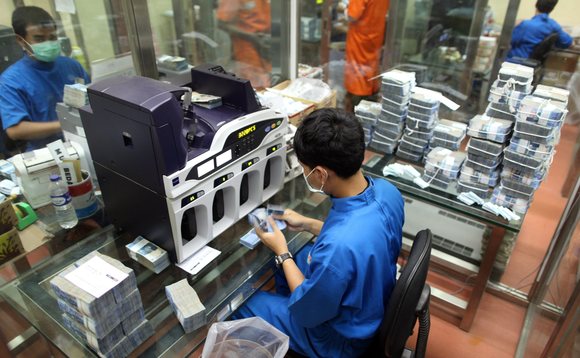
Indonesia financial services: Too hot to handle

For all the foreign strategic interest in Indonesia’s financial services sector, most deals are thwarted due to a huge gap in price expectations. PE investors are steering clear of the mainstream and looking for niche value
Farallon Capital Management overcame a competing bid from Standard Chartered to acquire a controlling stake in Bank Central Asia (BCA) in March 2002, but other obstacles were few and far between. Indonesia's largest retail lender had been nationalized four years earlier during the Asian financial crisis and the state-controlled owner wanted to recoup some of its outlay. The IMF and World Bank were also insisting on divestment as a condition for reactivating Indonesia's aid program.
Provided Farallon was comfortable with the risk involved - the country's economy was still in tatters - BCA was there for the taking. The hedge fund duly took a 51% stake for $542 million.
"We bought in at about 1x price-to-book (P/B) value, a price-to-earnings (P/E) multiple of 3x," recalls Tom Lembong, who was part of the Farallon team that worked on the deal. "It generated a crazy return. There were never any rights issues, only dividends, so there was no dilution." The hedge fund sold the bulk of its stake to domestic tobacco maker Djarum in 2007. When it exited the remainder two years later, BCA was Indonesia's largest financial services firm with a market capitalization of $8.6 billion.
A couple of years on, Lembong, now managing partner at domestic private equity firm Quvat Management, began negotiations with another bank, a medium-sized lender facing a host of challenges. The owner wasn't keen to give up control so Quvat put together a structure whereby it would take a minority stake but also lend money to the bank, using a portfolio of non-performing loans as a guarantee. The owner became confused, lost patience and finally pulled the plug on the deal.
Then and now
It is a familiar story in Indonesia's present-day financial services sector. No longer down on their luck and desperate for support, the likes of banks, insurers and brokerages are popular among strategic investors looking for a proxy to economic growth. But transactions are hindered by differences over price, a failure to grasp structures and a lack of selling pressure.
"There is a lot of interest but it doesn't always translate into actual transaction activity or completion," says David East, head of transactions and restructuring for KPMG Indonesia. "A large percentage of deals fall over on pricing and transaction structure. An investor might try to do a carve-out or create a newco around an unsophisticated private company. Things get too complex and they begin to drag - and that's before we even start the proper due diligence."
The sector has seen M&A activity of $10.8 billion since 2010, more than twice the figure for the preceding four years, according to Thomson Reuters. Transaction volume over each period is similar, with approximately 150 deals apiece.
The spike in average deal size has been driven by increasingly acquisitive Asian corporates. Japan accounts for just 16 of the 151 investments completed since 2010 but total capital deployed is $1.9 billion. Strip out DBS' $7.2 billion deal for Bank Danamon - the principal seller is Temasek Holdings, also DBS' controlling shareholder - and the Japanese share moves above 50%. In addition to Japan and Singapore, corporates from South Korea and China are most often seen looking at deals.
The motivation is clear: Indonesia's economy is growing at annual rate of about 6%, per capita income has doubled in the last 10 years, half the population is below 30 years of age, 40% of people don't have bank accounts and insurance penetration is below 2%.
Richard Williamson, head of Ernst & Young's Asia Pacific financial services lead advisory practice, finds himself in Jakarta once few weeks working on mandates, yet the drop-off rate between formal negotiations and closed transactions is higher than any other market in the region.
"We're aware of negotiations that have been ongoing, with multiple stops and starts, over 2-3 years," he says. "Some bank and insurance deals have been pitched around the market - formally and informally - for years and they and won't close unless someone really drives up the asking price."
Industry participants agree that the root of the problem is many sellers have no real incentive to do a deal - their businesses are solid and making money. It is estimated that 6-7 family-owned banks are currently marketing, plus a similar number of insurers, but they could merely be testing the water.
In a seller's market, valuations are inevitably pegged to historical highs. When HSBC bought a controlling stake in Bank Ekonomi Raharja for $607 million in 2008, it was 4.1x P/B, so would-be sellers use 4x as a benchmark, regardless of comparative asset quality. The insurance industry has a similar starting point, influenced by the $819 million - 4x P/B - that Japan's Mitsui Sumitomo Insurance paid for a 50% stake in Asuransi Jiwa Sinarmas, Indonesia's largest domestic life insurer, two years ago.
The pricing is too rich for many private equity investors. "It doesn't make sense to buy Indonesian banks and insurers right now, they are the most expensive in Asia," one regional buyout fund manager tells AVCJ. "This is the wrong time to buy a bank but the right time to sell."
Indeed, AVCJ Research's records on PE activity in Indonesian financial services show that only $209 million has been deployed since 2010. The golden period was 2002-2005 when $1.8 billion was committed across 11 deals. This was the spate of investments that began with Farallon's BCA buyout and saw Temasek and Khazanah Nasional enter the industry.
TPG Capital and Northstar Pacific Partners were also involved agreeing to buy a 71.6% stake in Bank Tabungan Pensiunan Nasional (BTPN), the country's seventh-largest lender, for around $200 million in 2007. In mid-May, Sumitomo Mitsui Banking Corp. agreed to pay $1.56 billion for 40% of the bank, or 4.5x P/B. The PE group's holding was diluted to 57.9% after BTPN went public and SMBC will take 32.6% of this. It implies a money multiple of at least 6x and 25% still to exit.
"The banking sector has been a pretty good hunting ground but I wonder where we go from here. It's difficult to see how you can make PE type returns when paying a significant premium to book value," says Mark Thornton, formerly 3i's head of Southeast Asia and now managing director of Indonesia Private Equity Consultants. "Even though the government wants to see more consolidation in the banking sector, it remains to be seen whether PE can play a role in this."
There are around 200 commercial banks nationwide and although consolidation is seen as a long-term inevitability, industry participants note that pressure for reform has slowed in recent years, perhaps due to the strength of the overall economy. Insurance is equally fragmented, with close to 100 non-life insurers and local life insurers. However, M&A options are also limited.
Once the top-tier banks are struck off the list because they are either already foreign-invested, state-owned or large independents with no interest in giving up equity, the second and third tiers offer slim pickings. Many smaller players are red-flagged for integrity issues and the few gems there are have family owners which might not be willing to sell at an acceptable price.
Look to the margins
In addition to moving down the banking food chain in search of value, private equity investors are moving into non-traditional areas of financial services. Late last year, for example, Northstar agreed to pay INR200 million for a 49% stake in domestic brokerage Trimegah Securites. Singapore's OCBC, Japan's SBI Holdings, Malaysia's OSK and South Korea's Daewoo Securities have also made investments in the space.
Although several professionals on the advisory side question the size of potential deal flow, E&Y's Williamson is focusing on brokerages and asset management companies because he believes this deals are more likely to close, citing the level of foreign investment in Indonesia on the debt and equity side.
"There is there is a genuine value-add for a domestic brokerage or asset manager partnering with a foreign name. They get access to global capital markets and an existing pool of global institutional investors," he explains.
The other area where private equity and strategic investors see potential is quasi-formal banking channels, which might involve anything from consumer finance to equipment leasing. AVCJ has records of three M&A deals in the latter category since mid-2011. Notably, Affinity Equity Partners and Saratoga Capital negotiated the acquisition of Austindo Nusantara Jaya's (ANJ) auto financing and car rental units last year.
According to a source familiar with the situation, this was part of a wider effort to secure a $100 million deal for a significant minority stake in Mitra Pinasthika Mustika (MPM), a leading domestic distributor for Honda motorcycles that is soon to go public.
"MPM had a fairly small financing unit but when the PE investors got involved they helped the company buy a business with a significant financing asset," the source says. "Financial services are becoming a key part of the overall business."
Despite attempts to create strategic alignment, discussions were challenging. Affinity initiated contact with MPM in 2009 and dialogue progressed sporadically. It also took about one year to close the deal with the family owners of ANJ. Quvat's Lembong warns that the environment is unlikely to become any easier as other investors follow private equity into the outer reaches of the financial services sector.
PE players will have to become more creative in their investment structures or fleeter of foot in pursuing transactions - or perhaps a combination of both. Even with global firms putting people on the ground in Indonesia, KPMG's East argues they might still be best served by partnering with local GPs who retain a distinct advantage. "They hear about things becoming available through their non-public intelligence networks," he says. "Then they conduct due diligence quickly and get things done quickly."
SIDEBAR: Regulatory ruckus - Who dares buys?
OCBC claims to have about 400 branches and offices in Indonesia; UOB and DBS have 213 and 40, respectively. Indonesian lenders, meanwhile, routinely complain about the difficulties they face setting up even a single branch in Singapore. This was the context for Bank of Indonesia (BI) Governor DarminNasution's remarks last week that DBS would only be allowed to own more than 40% of Bank Danamon if reciprocal efforts were made to open up the Singapore market.
It is a political debate that owes its origins to Indonesia's remarkably loose restrictions on foreign ownership of domestic banks. Until the 40% cap was introduced last year, overseas investors could hold up to 99% of a domestic player. As a result, eight of Indonesia's top 11 banks by market value are controlled by foreign banks, families, PE firms or sovereign wealth funds.
The rumblings that preceded the cap - there was talk of retroactive implementation - spooked many foreign investors. "Activity dropped off a bit due to the regulatory uncertainty, save in respect of sub-40% deals where activity levels have remained healthy, but things have picked up since greater clarity in respect of the 40% rule has been introduced," says Lee Taylor, a partner with Clifford Chance in Singapore.
As it stands, non-financial institutions and individuals are subject to shareholding caps of 30% and 20%, respectively, and although financial institutions are restricted to 40%, BI will make exceptions for those who meet certain standards for corporate governance and financial health. In cases where the criteria are not met, investors will have to reduce their stakes by January 2019.
DBS won approval to buy 40% of a 67.4% stake in Danamon owned Temasek Holdings - also DBS' controlling shareholder - but it wants to acquire the whole lot with a few to a full takeover. Other investors have yet to be so bold. Sumitomo Mitsui Banking Corp. set its sights on 40% of Bank Tabungan PensiunanNasional; South Korean lenders Shinhan Bank and Woori Bank sought 40% and 33% of Bank Metro Express and Bank Himpunan Saudara, respectively.
One source tells AVCJ that certain clients - not necessarily those listed above - have been getting informal feedback from BI that they can take controlling interests in domestic lenders.
On the other hand, there has been talk in Indonesia's parliament of a 49% limit on total foreign ownership, which would mean local banks remain in local hands. Investors hope this is nothing more than nationalist posturing that dies down after next year's presidential election.
Latest News
Asian GPs slow implementation of ESG policies - survey
Asia-based private equity firms are assigning more dedicated resources to environment, social, and governance (ESG) programmes, but policy changes have slowed in the past 12 months, in part due to concerns raised internally and by LPs, according to a...
Singapore fintech start-up LXA gets $10m seed round
New Enterprise Associates (NEA) has led a USD 10m seed round for Singapore’s LXA, a financial technology start-up launched by a former Asia senior executive at The Blackstone Group.
India's InCred announces $60m round, claims unicorn status
Indian non-bank lender InCred Financial Services said it has received INR 5bn (USD 60m) at a valuation of at least USD 1bn from unnamed investors including “a global private equity fund.”
Insight leads $50m round for Australia's Roller
Insight Partners has led a USD 50m round for Australia’s Roller, a venue management software provider specializing in family fun parks.







